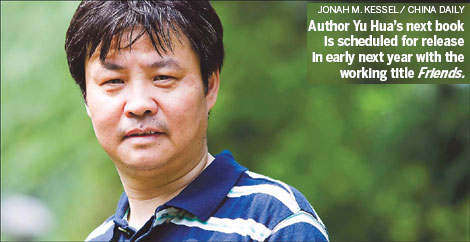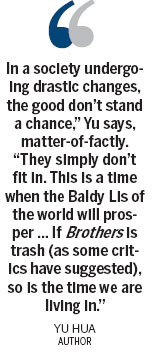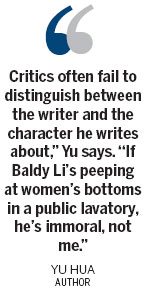 |
Large Medium Small |
|
 Author Yu Hua's next book is scheduled for release in early next year with the working title Friends. Jonah M. Kessel / China Daily
|
Yu Hua revels in his exposes of the good, the bad and the ugly in his novel Brothers and its sequel. Chitralekha Basu and Yang Guang report
After watching Spain upstage Netherlands at the World Cup final in South Africa, the novelist Yu Hua is contemplating a career switch to sports journalism.
| ||||
While journalism and fiction-writing are sometimes known to overlap and grow out of each other, Yu giving up the seductively charming, pulsating, rambunctious, and often incredibly bizarre world of his novels, to write about off-sides and missed penalties would be a major let-down.
He could be mistaken for a scruffy sophomore, smoking endless rounds of cigarettes and taking each provocative question lobbed at him with an enthusiastic chuckle. But Yu, at 50, is one of China's foremost writers, along with fellow stalwarts of experimental fiction, Mo Yan and Su Tong, whom the world is watching.
His novel in the making is tentatively titled Friends. Due early next year, it will be his first in five years since Brothers - a sensational satire of Chinese society from the 1960s to the 1990s.
The rights of his new essay collection, China in 10 Words, whose French version is due out in September, and the English early in 2011, "were sold at the Frankfurt Book Fair last year, even before I had put the manuscript together (by collating essays scattered across various publications)", says the author.
"All this is courtesy of the huge success of Brothers," he adds, casting a glance at the jumbo English edition by Picador, which made it onto the Man Asian shortlist in 2008 and has sold more than 1 million copies in China.
Brothers is an epic novel both in terms of volume and panoramic sweep. It opens in the heyday of persecution and deprivation in the mid-1960s when Baldy Li and Song Gang, aged 8 and 9, become brothers by force of circumstance. It follows their journey to the free-market boom in the early-1990s. The smooth-talking, manipulative, crass, motor-mouths like Baldy Li make a life, drive a BMW during the day and a Mercedes after sundown, and even have toilet-seats plated in gold; while the meek and stubbornly self-righteous Song Gang has no place in such a world.
Does he really believe there's no hope for the honest, upright and innocent?

"In a society undergoing drastic changes, the good don't stand a chance," Yu says, matter-of-factly. "They simply don't fit in. This is a time when the Baldy Lis of the world will prosper."
"If Brothers is trash (as some critics have suggested), so is the time we are living in," he adds.
There is a touch of Baldy Li-esque mischief, irreverence, even arrogance and robust energy in Yu - both in his personality and writing. There's a glow of success on his face, a spring in his step and a resonating echo as he breaks into intermittent bursts of raucous laughter.
Writing, he says, has changed him from being a "shy, conservative, stammering boy" to a "talkative and eloquent guy" who has toured around the world, giving book talks and attending conferences. It was during a 30-university tour in the United States that he came across archival material at the library of the University of California, Berkley. That was the genesis of Brothers.
When he reveals that Friends covers the same time span as Brothers and its theme is "hatred", alarm bells ring - images of the relentless pummeling of fellow human beings and lovelorn fornications from Brothers pop up - hasn't Yu done this theme to death, literally?
He tells us Friends will give us a more intimate glimpse inside people's heads, "their changing mindsets in the last 40 years".
"The hatred is going to get more intense but so will the love, compassion and tolerance," Yu says, insisting that acrimony between people is as strong today as it was during the "cultural revolution" (1966-76). "But Friends is going to have a happy ending," he says, reassuringly.
For a writer living in these hopelessly cynical times, Yu seems to have done rather well for himself. He has earned a mass following - "sales are important, for only after one has established a readership can one disregard the censors and ensure total freedom of expression" - attracted worldwide media attention, picked up prestigious international prizes like the James Joyce Foundation Award, has the poet Chen Hong for a wife who also doubles as his first critic, and is even free from losing sleep over his teenage son's reactions to the excess of erotica and brutalities in his writing. Especially since a classmate of his son's - when he was in elementary school - told him: "Uncle, you are worrying too much. We have seen far more than you care to write."
In Brothers, two middle school bullies, turned Red-Guards, turned debauched and self-seeking individuals, fashion themselves into a writer and a poet. Is that a realistic comment on the race of scribes in general?
"Sure," Yu says, breaking into his trademark chuckle. "I know what they are. In all my later works, writers aren't going to be nice guys. That's a promise."
Penmanship rooted in blood and gore
Yu Hua shot to international fame in 1994, when Zhang Yimou's To Live, based on Yu's novel, won the Grand Jury Prize at Cannes. The story of Fugui - a decadent landlord who goes from being a pauper to an inadvertent recruit in the battle between the Kuomintang and the People's Liberation Army, and survives famine, deprivation and the excesses of the "cultural revolution" (1966-76), losing almost everything except his will to live - was representative of a generation.

The slew of international awards, including Italy's Premio Grinzane Cavour, 1998, that came its way was a recognition of the extraordinary resilience of a people as much as it was of Yu's powerful penmanship.
He learnt to look at blood, injury and physical mutilation with a clinical detachment quite early on. The son of doctor parents, Yu grew up inside a hospital. For five years he was a dentist until he joined the State-run culture wing as a staff writer.
The landscape of blood, pus and rotten teeth was carried over to Yu's early fiction, written in the mid- to late-80s.
Stories like The Past and the Punishments conjure up a surreal world of dark asphyxiating torture chambers where assassins and victims end up aestheticizing murder.
On the Road at 18, 1987, about a solitary young man's dejection with his life and times, is told with a searing brutality. "It was 10 years after the 'cultural revolution'. There was a sudden realization that one could write what one wanted," recounts Yu.
He moved to a more narrative-driven style in To Live, 1993. "I felt the most appropriate way to tell Fugui's story was in a language that he would use, find a new voice."
He changed his style again in Brothers, juxtaposing the risqu with the soft romantic, high-octane melodrama with cynical black humor, as that was a story told from multiple perspectives.
Backstory
Yu Hua's idols
1. Lu Xun: author, China (1881-1936)
"I share two traits with Lu Xun: Like him I am truthful/realistic and cynical."
2. Charles Dickens: novelist, England (1812-1870) and Honore de Balzac: novelist, France (1799-1850)
"In England they call me the Chinese Dickens and in France I'm the Chinese Balzac. I think Brothers is more on the lines of Dickens, while my new novel is Balzac-ian."
3. Fyodor Dostoyevsky: novelist, Russia (1821-1881)
"My new novel is going to have resonances of Dostoyevsky whom I immensely admire."
4. Ingmar Bergman: filmmaker, Sweden (1918-2007)
"After watching Wild Strawberries I walked back home, trudging 22 km, carrying the images in my head. That was in the early 1980s, the projection was blurry, there were no subtitles."
5. Francisco Goya: painter, Spain (1746-1828)
"Goya's paintings from his black period (when the artist was haunted by the fear of insanity) inspire me."
6. Anna Karenina (novel by Leo Tolstoy, Russia, published 1873-77) and Madam Bovary (novel by Gustav Flaubert, France, published 1856):
"These two are like millstones round my neck. Whenever I think of writing a strong female character I keep asking myself if I can match up to either.
China Daily